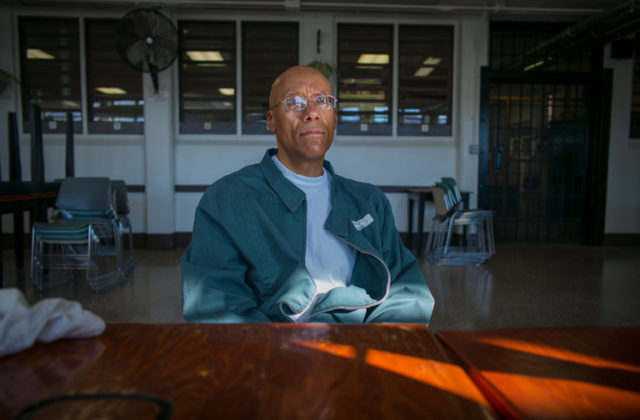Four Decades Later, Teenaged Killer is Paroled, and Deported
Posted by KT on Monday, January 30, 2017 · Leave a Comment
The day this article appeared the last letter of my decade long prison correspondence with Dempsey Hawkins, with the few dollars I could spare towards his first days of freedom, was returned to me: addressee no longer here. After 39 years my pal is no longer penned.
The parole board decision was different from most — not a no, which the inmate had heard many times. More like a yes, with a condition attached.
The inmate, Dempsey Hawkins, had spent his entire adult life in New York state prison for a crime he committed on Staten Island in 1976, when he was 16.
Many parole commissioners over the years denied his release, recalling the details of his offense, the day he murdered his former girlfriend. But in August came a reversal with a twist: Mr. Hawkins, now 57, could be paroled on the condition that he be deported to England.
It was a country he knew next to nothing about personally. Mr. Hawkins was born in London in 1959 to an English mother and an American father stationed overseas with the United States Air Force. They split up, and Dempsey moved to Staten Island with his mother when he was 6.
Asked for a memory of England during an interview in prison, he paused.
“Raining,” he said.
He wasn’t complaining, but months had passed since the decision, with little movement toward his release, and he did not want to get his hopes up. On the contrary, with his first cause to believe his freedom might be near, he was somber during the interview at Woodbourne Correctional Facility in November, thinking back on that day long ago.
“I never stop reflecting in one sense or another,” Mr. Hawkins said. “There’s always things to remind me. It never leaves me. My shame of it is absolute. It’s perpetual.”
As a teenager, he had dated a girl named Susan Jacobson, but they split up.
Their parting, Mr. Hawkins said, caused a breakdown in him.
“At one point I thought I had a reason, that I was in love with her and couldn’t go on without her,” he said. He thought about suicide. “Then murder took over my thoughts and stayed there,” he said.
On May 15, 1976, he lured Susan, who was 14, to a secluded area on the island marked with underground rooms like bunkers. He took her into one, choked her to death and left her body there.
Susan’s family searched for the missing girl for days, and Mr. Hawkins pretended to help, calling out: “Susan! Susan!”
“Every time we got close, he would come up with a story to take us to a different location,” Susan’s sister Janice said in 2011.
Months later, Mr. Hawkins moved to Illinois to live with his father, a man he only just met on that occasion, when he was 17. Susan’s body was found in 1978, and Mr. Hawkins was arrested and brought back to New York.
“There was fear and relief mixed in,” he recalled.
He was tried and convicted of murder and sentenced to 22 years to life in prison, putting his earliest chance at parole in 2000. He was denied, as he would be after hearings every two years, and at separate hearings after his legal appeals. Commissioners regularly cited his clean disciplinary record and his academic achievements in prison, but said his behavior in the days after the murder, pretending to help, made him unfit for release.
An article about his case last year quoted Ms. Jacobson’s family criticizing Mr. Hawkins for showing no remorse. Mr. Hawkins said that was far from true.

“Remorse has been part and parcel with my being since I’ve been in here,” he said. “When I look back at my crime, I’m in disbelief.”
His mother still lives on Staten Island. She told him that she would move back to England with him, but after a trip there over the summer, she changed her mind.
“She forgot about how cold, dreary and basically miserable it was over there in the country,” he said. “She said: ‘Don’t worry. There’s always Skype.’ I said, ‘Is it free?’”
He said the “prison grapevine” had informed him that past deportations sometimes took months to process. He posed for a photo for an English passport, and was later told that the glare on his glasses had obscured his eyes, so a month later, he posed for another.
He and a lawyer who assisted him on his parole appeals, Issa Kohler-Hausmann, reached out to a professor in England who has worked with released inmates, and who promised to arrange a restaurant job to get him started.
“My job is going to be to find a better job,” Mr. Hawkins said. “Something to do with writing.”
He said he was in no rush to learn about email and smartphones. “I’m not looking to get into sensory overload,” he said.
Rather, he looked forward to quieter pursuits. “Walking down the street and just walking into a bookstore,” he said.
Two weeks ago, he was transferred out of Woodbourne for short stays at other prisons, ending up in one in Buffalo. There, last Monday, he was handed bluejeans and a sweatshirt and was handed off to the custody of Immigration and Customs Enforcement officers, who flew with him to Dulles International Airport and, that night, to Heathrow Airport in London.
He arrived on Tuesday. A cousin he had never met had arranged to pick him up. The professor, who asked that her name be withheld for Mr. Hawkins’s privacy, arranged for him to meet with workers from Prisoners Abroad, an agency that provides support for convicts deported to Britain. Someone handed him a book, “Tennis Whites and Teacakes,” to help him get to know his new home.
On Wednesday, he answered his ringing telephone.
“I’m in a dream state right now,” he said in a brief interview.
He was struck by the darkness. Walking outside earlier that night, he got lost.
“When you go out in prison at night, it’s floodlit,” he said. “It’s like a baseball game.”
The family of Susan Jacobson opposed his release from prison over the years, and her sister Barbara Reno said on Friday that the family was disappointed about his parole.
“But it’s out of our hands,” she said. “We don’t feel it’s fair he’s being released, but we are happy he’s deported and not here.”
Upon landing in London, Mr. Hawkins was handed an English passport by an immigration official.
“He said, ‘You can go anywhere in the world with this passport but one country,’” Mr. Hawkins recalled. “I said, ‘I got you.’”

 Jumel Terrace B&B
Jumel Terrace B&B Life Turns Man Up & Down
Life Turns Man Up & Down The Private Library
The Private Library